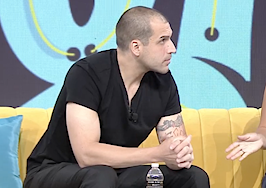Watch the livestream from Inman Connect Las Vegas today through Friday for free by joining Inman Select. Get full access to all Inman news stories for one year for the half-off price of $99.
By now, everyone in real estate has heard that they ought to be using social media, and specifically posting video.
Thursday afternoon during two different sessions at Inman Connect Las Vegas, Kyle Whissel and Marki Lemons-Ryhal counseled agents on how to win clients and avoid wasting their time with video on social media. Whissel is the team leader at the Whissel Realty Group, an eXp brokerage, while Lemons-Ryhal is a marketing professional and social media expert. Here’s what they recommended:
1. Create consumable, “thumb-stopping” content

Kyle Whissel
Whissel said that in the past, he used to produce videos that displayed his company’s brand logo. That approach might have made sense if people were watching an old school TV commercial, but it doesn’t work today.
“They only have a fraction of a second to see a video and engage with it,” Whissel explained.
Whissel’s point was that the very first image a viewer sees has to be so engaging that he or she stops scrolling and watches.
2. Set up standalone pages where content revolves around specific themes
“People don’t want to like a real estate page,” Whissel said, adding that people fear being bombarded with ads and professional content.
Instead, he recommended building social media pages for content about specific topics.
In Whissel’s case, that meant setting up pages focused on things like local restaurants and historical societies. Whissel uses these accounts to grow his following on social media, but he doesn’t post about real estate on them. Rather, he sees the pages as a channel to organically meet new people. For example, Whissel said he can use his page on restaurants to hold events — where he could theoretically pick up new clients in person.
3. Be aware of how the video actually looks

Marki Lemons-Ryhal
Lemons-Ryhal said that she sometimes sees selfie-style videos that are shot from below a person’s face, which is not flattering. Other times, videos are lit poorly, or the image is obscured because the camera lens is dirty.
The point is, real estate agents need to be conscientious about what exactly they are doing with their phones while shooting video, she said.
She specifically suggested holding the phone “about an inch above eye level,” and moving around in any given room to see which spot has the best lighting.
“You need to wipe your lens off every single day,” Lemons-Ryhal added. “And if you’re consistently creating video content, I want you to clean your lens off every single time.”
4. Shoot vertical video
Whissel pointed out that most people are engaging with social media content on their phones, which are oriented vertically, not horizontally. And Lemons-Ryhal said that “vertical content is the fastest growing content in the history of the internet.”
Shooting and posting videos in a vertical, or portrait, orientation means that they can take up consumers’ entire phone screens. That will make the videos both more engaging, as well as simply easier to understand.
Lemons-Ryhal also pointed out that Facebook Stories and Instagram Stories — both ephemeral, Snapchat-like video platforms that many social media experts have extolled at Inman Connect — use vertical video. Shooting video in that orientation, then, makes it easier to use on those platforms.
5. Don’t go nuts with hashtags
Lemons-Ryhal described Instagram as the only place where it is “socially acceptable to use 30 hashtags.” Other social networks either don’t use hashtags at all, or incorporate them much more sparingly.
On Instagram, hashtags can actually be an important way to reach new audiences and boost engagement. But even there, Lemons-Ryhal urged moderation.
“Every study has shown that nine is the ideal number of hashtags,” she said.
6. Tease videos with short clips and still images
Whissel compared creating video for social media to Hollywood movies.
“When a Hollywood movie drops there’s a trailer,” he said. “You want to do that with Facebook.”
Whissel recommended breaking longer video content down into clips that can be posted on multiple platforms. He also said that he pulls quotes out of his videos, superimposes them on a still image or photograph and then posts the resulting “quote card” to Instagram.
“You want to take all this content and repurpose it,” he explained. “Get it into all these different channels.”
7. Find the people who liked your video content and invite them to like your page
Building an online following is tough, especially if you’re just asking friends and family to like your Facebook and Instagram pages. But Whissel offered a more targeted strategy: look and see who interacted with a particular video or post, and then invite them to like your page.
“These people become a part of your audience,” he explained. “This is one of the best ways to grow your page.”
8. Don’t forget about YouTube
Much of the discussion about social media focuses on Facebook and Instagram, but Whissel described what is essentially an ongoing YouTube renaissance.
As a result, Whissel advised agents to put “every single video you create on YouTube.” Agents also need to be smart about using the platform, adding descriptions and tags that accurately represent their content.
If they do that, agents should be able to use YouTube as yet another channel through which to broadcast their brand and meet new clients.
“The more time you put into these things,” Whissel concluded, “the more people you’re going to get watching your videos.”








